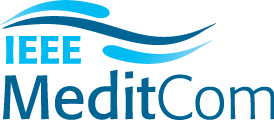IEEE MeditCom 2022 Demo track provides a space for researchers and practitioners to bring hands-on experiences to conference attendees. We look forward to the interesting demonstrations of:
- Functional prototypes of devices and systems
- Mobile and wearable applications and services
- New interaction techniques
- Innovative examples of mobile experiences
- Toolkits and prototyping techniques for mobile and wearable interfaces
A best demo award will be discerned to recompense the best idea and demonstration.
Demo submissions should be made via EDAS by following this link: https://edas.info/newPaper.php?c=29854&track=112241
Important Dates
Three-page demo descriptions: 30th June 2022 (Extended)
Notification of acceptance: 15th July 2022 (Extended)
Technical demonstrations showing/presenting innovative and original research are solicited. In general IEEE MeditCom 2022 Demo track is interested in demonstrations and Proof of Concept implementations of technology that validate important research issues or showcase realistic applications in the following topics of interest (but not limited to):
- 5G/6G Mobile Systems and their Components
- Network Architectures, SDN, NFV
- Cloud Communications and Data-center Networks
- Optical Networks and Systems, Radio over Fiber
- Mobile and Wireless Communications and Networking and Beyond
- Molecular and Nanoscale Communications
- Satellite and Space Communications
- Underground and Underwater Communications
- Image, Speech and Signal Processing for Communications
- Big Data and Machine Learning for Communications
- Semantic Web and Ontologies
- Internet of Things, Smart grids, UAV and Vehicular Networks
- Green Communications and Energy Efficient Computing
- Network Applications and Services
- Analytical Models, Simulation, Testbeds & Prototypes
- Network Management and Cognitive Radio
- QoE/QoS Support and Cross-layer Optimization
- Performance Evaluation of Communication Systems
- Massive MIMO, Signal Processing, and Coding
- Advanced PHY and MAC techniques
- Security, Privacy, Trust and Blockchain
- Cybersecurity
- Continuum IoT/Edge/Cloud
- Edge services deployment
Submission Instructions
Submissions should be a three-page minimum (max 4 pages) summary that follows the IEEE formatting guidelines (standard 2-column IEEE article layout) : refer to the IEEE submission instructions for details. All submissions will be subject to peer review, according to IEEE policies.
Be as specific as possible in describing what you will demonstrate or display as demo. Demonstrations should be based on technical achievements and prototypes at a research stage (i.e. no pre-commercial or product demonstrations are allowed).
A complete submission should be three pages minimum in length (4 pages maximum) and proposal summary that will include the following:
- A 35-word abstract
- An Overview section giving a full description of the research and technologies to be demonstrated
- An Innovation section describing the problem and novelty of the approach in solving it
- A section describing the relevance for MeditCom explaining why the MeditCom audience and communities should be interested in this demo
- The demo summary should explain the objective and contents of the demo, and detail its configuration and main elements. The objective should be to demonstrate an innovative application, a working prototype or a novel concept.
- A section describing the demo processing and how it could be shown if online.
- A section describing the material requested for the demo (tables, poster, screen, etc).
- When possible a link toward a video of the demo.
The proposal summary demo session will take place physically (locally) and/or online, depending on the conference type (physical or hybrid). Summaries of accepted demos will be included in the IEEE MeditCom 2022 Proceedings. Accepted and presented summaries will be submitted to IEEE Xplore®.
Demo Co-Chairs
Nathalie Mitton, Inria, France, nathalie.mitton@inria.fr
Christos Tranoris, University of Patras, Greece, tranoris@ece.upatras.gr


